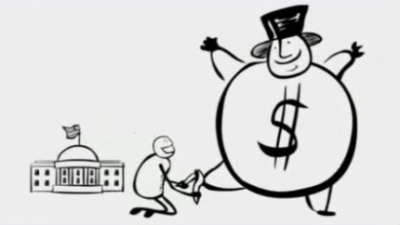Difference between revisions of "Regulatory capture"
(stub) |
m (Text replacement - "|wikipedia=http://en.wikipedia.org/" to "|wikipedia=https://en.wikipedia.org/") |
||
| Line 1: | Line 1: | ||
{{Concept | {{Concept | ||
| − | |wikipedia= | + | |wikipedia=https://en.wikipedia.org/wiki/Regulatory_capture |
|description=When a regulator becomes a tool of the groups it was intended to regulate. | |description=When a regulator becomes a tool of the groups it was intended to regulate. | ||
|type=idea | |type=idea | ||
Revision as of 14:58, 24 July 2016
 | |
| Type | idea |
| Interest of | • Bill Gates • Rockefeller Foundation |
| When a regulator becomes a tool of the groups it was intended to regulate. | |
When a regulator becomes a tool of the groups it was intended to regulate.
An example
| Page name | Description |
|---|---|
| Cheney Loophole | A 'get out of jail free card' for the Fracking industry, to permit them to poison the US drinking water. |
A Regulatory capture victim on Wikispooks
| Title | Description |
|---|---|
| National Institutes of Health |
Related Quotations
| Page | Quote | Author | Date |
|---|---|---|---|
| Warren Buffett | “In the pharmaceutical world of economic durable competitive advantages, having a patent on a best-selling drug is about as good as it gets. The next best thing is having a monopoly on selling a country’s national health program the vaccines it needs for its childhood inoculation programs. Both of these businesses are hugely profitable and GSK (GlaxoSmithKline) excels in both these categories.
The vaccine business is particularly attractive because an individual shot (or jab) costs GSK approximately $1.50 to manufacture and it sells to national vaccine programs for approximately $9 a shot. That gives GSK a net profit of approximately $7.50 a shot. This markup gives GSK a very healthy profit margin that improves with each and every new disease that the company develops a vaccine for. Consider this: GSK's profits rose 10% with the 2009 Swine Flu outbreak—a disease for which the company had a state-of-the-art vaccine ready to inoculate the masses. In addition to its patents and the durable competitive advantage GSK has with the vaccines, it also established the relationships with the world's governments, and it has the financial capital to create, manufacture, and sell vaccines on a world scale. If you were in charge of the health of a nation's 30 million-plus children, who would you buy your vaccines from? Every year? Year after year? You’d pick the biggest and the best. There are only four pharmaceutical giants that control most of the vaccine production in the world and GSK is one of them. There is another component to the vaccine equation that also spells BIG MONEY: Every year, women all over the world give birth to approximately 133 million new babies, 4.3 million babies in the U.S. alone. With the United States Centers for Disease Control (CDC) recommending that children aged birth through six receive 34 individual vaccine shots/jabs, that means the market for those 34 vaccine shots/jabs increases every year by 4.3 million in just the U.S. alone. This in turn means that the vaccine manufacturers selling in the U.S. have the potential to earn a profit of $1.09 billion every year (4.3 million x 34 x $7.50 = $1.09 billion). Consider the number of yearly vaccines worldwide and the numbers are staggering—approximately $34 billion a year (133 million x 34 x $7.50 = $33.9 billion). After ten years, in the U.S. alone, vaccine manufacturers will see more than $10 billion in net profit. On a world scale, the number jumps to a potential $340 billion in profits. And wait, it gets even better. With the invention of each new vaccine comes a patent that is good for twenty years and guarantees that no one else can make the vaccine. In other words, the company has a monopoly. Even when the patents expire, other companies rarely step into the market because the major manufacturers have a permanent relationship with the government health departments of the world. This enables manufacturers to continue making the same vaccines year after year while maintaining their large profit margins even after their patents have expired. And last but not least, vaccine manufacturers in the US are completely immune from lawsuits. Back in the 1980s several bad batches of vaccines injured so many children that the resulting successful lawsuits threatened to bankrupt the manufacturers, so the manufacturers lobbied a bill through Congress making them a protected class.” | Warren Buffett Mary Buffett | 2011 |
| Richard Olney | “The Commission... is, or can be made, of great use to the railroads. It satisfies the popular clamor for a government supervision of the railroads, at the same time that that supervision is almost entirely nominal. Further, the older such a commission gets to be, the more inclined it will be found to take the business and railroad view of things... The part of wisdom is not to destroy the Commission, but to utilize it."<a href="#cite_note-5">[5]</a>” | Richard Olney | 1892 |